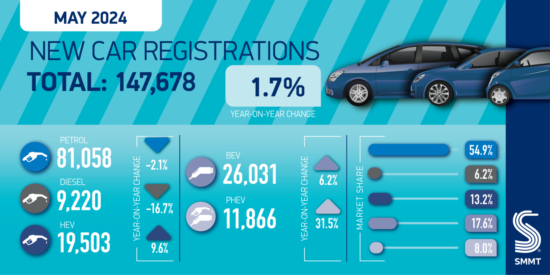New car registrations – SMMT calls for ‘carrots, not just sticks’

The UK new car market marked its 22nd consecutive month of growth as registrations rose 1.7 per cent in May, according to the latest figures from the Society of Motor Manufacturers and Traders (SMMT). With 147,678 units reaching the road, it was the best May market performance since 2021, although it remains down some -19.6 per cent on 2019.
Fleets and businesses continued to fuel market growth, up 14.0 per cent and 9.5 per cent respectively, narrowly offsetting a -12.9 per cent decline in private retail uptake. While deliveries of both petrol and diesel cars fell, demand for electrified vehicles rose, with plug-in hybrids (PHEVs) recording the highest growth of all powertrains, up 31.5 per cent to reach an 8.0 per cent market share, and hybrids (HEVs) rising 9.6 per cent, maintaining their status as the third most popular fuel type after petrol and battery electric at 13.2 per cent of the market.
Battery electric vehicle (BEV) registrations also outperformed the market, rising 6.2 per cent to claim a 17.6 per cent market share, up from 16.9 per cent in the same month last year. Uptake is still driven by the fleet sector, where volumes rose 10.7 per cent. Private retail BEV uptake, meanwhile, fell by 2.0 per cent (just 98 registrations short of May last year). This performance, although encouraging, is still below the trajectory mandated on manufacturers by government in its Vehicle Emissions Trading Scheme, which demands 22 per cent of new vehicles sold this year by each brand must be zero emission. With a choice of more than 100 EV models now available, and a raft of compelling offers, manufacturers are dedicated to driving change, but meeting targets will require more support.
Manufacturer discounting cannot be sustained indefinitely as it undermines the ability of companies to invest in next generation technologies. The market performance underlines the need for the next government to provide private consumers with meaningful purchase incentives.
While certain private buyers can access some of the benefits enjoyed by business buyers through salary sacrifice schemes, providing universal access to incentives would dramatically increase BEV uptake and accelerate the decarbonisation of road transport. Temporarily halving VAT on new BEV purchases, combined with a cut in the VAT levied on public charging from 20 per cent to 5 per cent – in line with domestic use – would drive up demand, putting more than a quarter of a million EVs on the road instead of petrol or diesel cars over the next three years.
Mike Hawes, SMMT Chief Executive, said: “As Britain prepares for next month’s general election, the new car market continues to hold steady as large fleets sustain growth, offsetting weakened private retail demand. Consumers enjoy a plethora of new electric models and some very attractive offers, but manufacturers can’t sustain this scale of support on their own indefinitely. Their success so far should be a signpost for the next government that a faster and fairer transition requires carrots, not just sticks.”



Comments